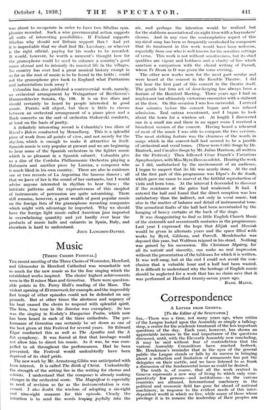Music
[THREE CHOIRS FESTIVAL.]
TIIE recent meeting of the Three Choirs of Worcester, Hereford, and Gloucester in Hereford Cathedral was remarkable not so much for the new music as for the fine singing which the established works inspired. The choirs' highest achievements were in the B minor Mass and Gerontius. There were question- able points in Dr. Percy Hull's reading of the Mass. The violent opening of Et resurrezit, for example, and the impossibly fast tempi of other episodes could not be defended on any grounds. But at other times the alertness and urgency of his beat caused the choirs to respond with splendid spirit. The firm, true tone in the Sanctus was exemplary. So too was the singing in Kodaly's Hungarian Psalm, which now has been heard in each of the three cathedrals. The per- formance of Gerontius can certainly be set down as one of the best given at this Festival for several years. Sir Edward Elgar conducted this as well as The Apostles and the A fist symphony. It was feared at first that lumbago would not allow him to direct his music. As it was, he was com- pelled to sit throughout the performances. Had he been prevented, the Festival would undoubtedly have been deprived of its chief pride.
The new work by Mr. Armstrong Gibbs was anticipated with keen interest. It is called The Birth of Christ. Undoubtedly the strength of the setting lies in the writing for chorus and soloists. I understand that the composer is already making changes in the orchestral score. The Magnificat is especially in need of revision so far as the instrumentation is con- cerned. I also -doubt the wisdom of adopting a six-eight and nine-eight measure for this episode. Clearly the intention is to send the words leaping joyfully into the
air, and perhaps the intention would be realized but for the stubborn association of six-eight time with a haymakers' chorus. And in any case the contemplative aspect of this mystical song has been so frequently overlooked by composers that its treatment in this work would have been welcome, especially from one who is well-known for his sensitive settings of verse. This work is not without sensitiveness, but its chief qualities are vigour and boldness and a clarity of line which sanction a comparison with the choral writing of Purcell, whose Te Hewn in D was given the same evening.
The other new works were for the most part secular and were heard at the concert in the Kemble Theatre. I did not hear the first part of this concert in the theatre itself. The gentle but firm art of door-keeping has always been a feature of the Hereford Meeting. Three years ago I had an unpleasant but ultimately victorious encounter with a stalwart at the door. On this occasion I was less successful. I arrived four minutes before the concert began and was refused admission. Zeal outran resentment, and I began to look about the town for a wireless set. At length I discovered one in a small inn and there in an upper room I received a broadcast version of the concert. Having heard a rehearsal of most of the music I was able to compare the two versions. The most striking feature was the clearness of the words in songs which in the concert-hall had seemed to be a jumble of orchestral and vocal tones. (These were Celtic Songs by Dr. Bantock, and Cavalier Songs by Mr. Julius Harrison, all written for the Festirni.) Then followed Cesar Franck's Variations Symphon iques, with Miss Myra Hess as soloist. Hearing the work as I did, undisturbed by the environment of an audience, I began to suspect that its life was nearly done. At the end of the first part of this programme was Elgar's In the South, which gave me cause to marvel at the faithful reproduction of viola and horn tone. At the interval I descended to discover if the resistance at the gates had weakened. It had. I entered the hall and found that the direct reception was less satisfactory than the indirect, not only in vocal music, but also in the matter of balance and detail of instrumental tone. The acoustical faults of the hall had been accentuated by the hanging of heavy curtains at the back of the stage.
It was disappointing to find so little English Church Music of the sixteenth and seventeenth centuries in the programmes. Last year I expressed the hope that Elijah and Messiah would, be given in alternate years and the space filled' with works by Byrd, Gibbons, and Purcell. Mendelssolin was deposed this year, but Wolfrum reigned in his stead. Nothing was gained by- his succession. His Christmas Mystery, for all its naivete and sincerity, can • make no real impression without the presentation of the tableaux for which it is written. It was well sung, but at the end I could not avoid the con- clusion that a valuable hour and a half had been wasted. It is difficult to understand why the heritage of English music should be neglected for a work that has no claim save that it was performed at Hereford twenty-seven years ago.
BASIL MAINE.




















































 Previous page
Previous page